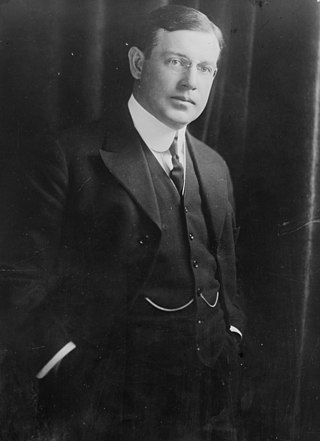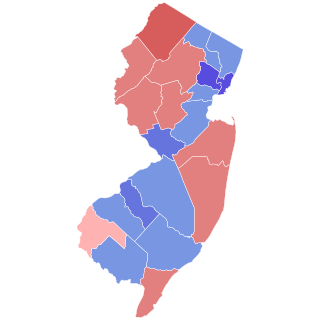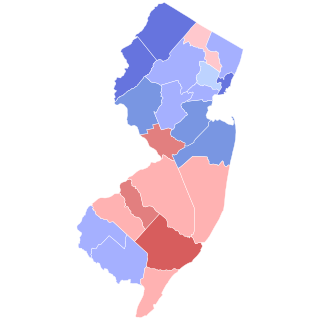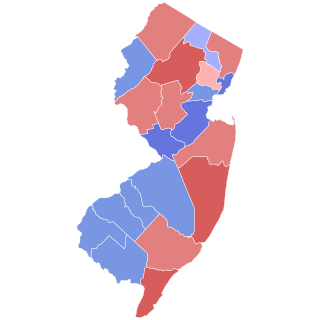
Walter Evans Edge was an American diplomat and Republican politician who served as the 36th governor of New Jersey, from 1917 to 1919 and again from 1944 to 1947, during both World War I and World War II. Edge also served as United States Senator representing New Jersey from 1919 to 1929 and as United States Ambassador to France from 1929 to 1933.

Edward Irving Edwards was an American attorney, banker, and Democratic Party politician who served as the 37th Governor of New Jersey from 1920 to 1923 and represented the state in the United States Senate from 1923 to 1929. He was a leading critic of Prohibition.

Edward Casper Stokes was an American Republican Party politician, who served as the 32nd governor of New Jersey, from 1905 to 1908.

Joseph Sherman Frelinghuysen Sr. represented New Jersey as a Republican in the United States Senate from 1917 to 1923.

The 2006 United States Senate election in New Jersey was held on November 7, 2006. Bob Menendez, who had served as an interim appointee, was elected to a six-year term in office. He defeated Republican Thomas Kean Jr. in the general election.

Robert Winthrop Kean was an American Republican Party politician from the state of New Jersey. Kean represented parts of Essex County, New Jersey in the United States House of Representatives from 1939 to 1959. He retired from the House to run for United States Senate in 1958, but was defeated by Harrison A. Williams.

Hamilton Fish Kean was a U.S. Senator from New Jersey.

The 1988 United States Senate election in New Jersey was held on November 8, 1988. Incumbent Democratic U.S. Senator Frank Lautenberg won re-election to a second term with a margin of 8.37%. This is the last time that a Senate candidate was elected to the United States Senate in New Jersey at the same time that a presidential candidate of the opposite party won New Jersey.

Lillian Ford Feickert was an American suffragist, New Jersey state political organizer, and the first woman from New Jersey to run for United States Senate. She served as the President of the New Jersey Woman Suffrage Association from 1912 to 1920, and later helped organize the New Jersey League of Women Voters. She went on to serve as the Vice-Chairman of the New Jersey Republican State Committee and unsuccessfully ran for the US Senate in 1928.

The 1981 New Jersey gubernatorial election was held November 3, 1981. Republican Speaker of the New Jersey General Assembly Thomas Kean narrowly defeated Democratic U.S. Representative James Florio, 49.46%-49.38, following a recount. Kean's margin of victory was 1,797 votes out of more than two million votes cast. As of 2025, the 1981 gubernatorial election remains the closest gubernatorial contest in New Jersey history.

The 1913 New Jersey gubernatorial election was held on November 4, 1913. Democratic acting Governor James Fairman Fielder, who resigned a week before the election so that he could succeed himself, defeated Republican former Governor Edward C. Stokes and Progressive former state senator Everett Colby.

The United States Senate special election of 1938 in New Jersey was held on November 8, 1938.

The United States Senate election of 1916 in New Jersey was held on November 7, 1916.

The 1911 United States Senate election in New Jersey was held on January 24–25, 1911. Republican incumbent John Kean did not run for re-election to a third term. The open seat was won by Democrat James Edgar Martine with Republican former Governor Edward C. Stokes as the runner-up.

The United States Senate election of 1922 in New Jersey was held on November 7, 1922.

The 1924 United States Senate election in New Jersey was held on November 4, 1924. Incumbent Republican Senator Walter Evans Edge was re-elected to a second term in office. He would not complete the term, resigning from office in 1929 to be sworn in as the U.S. Ambassador to France.

The United States Senate elections of 1930 in New Jersey was held on November 4, 1930.

The 1930 United States Senate election in Illinois took place on November 4, 1930.

The United States Senate election of 1934 in New Jersey was held on November 6, 1934.

The 1958 United States Senate election in New Jersey was held on November 4, 1958.























